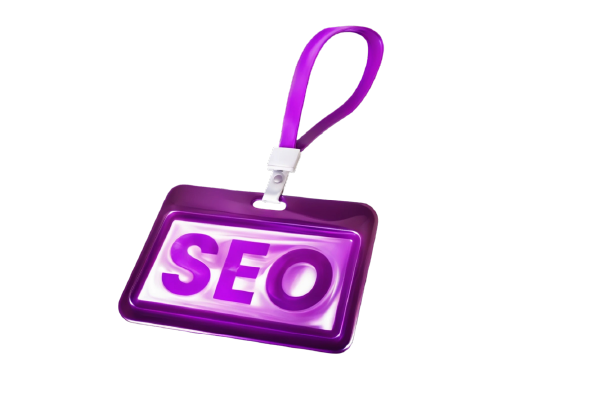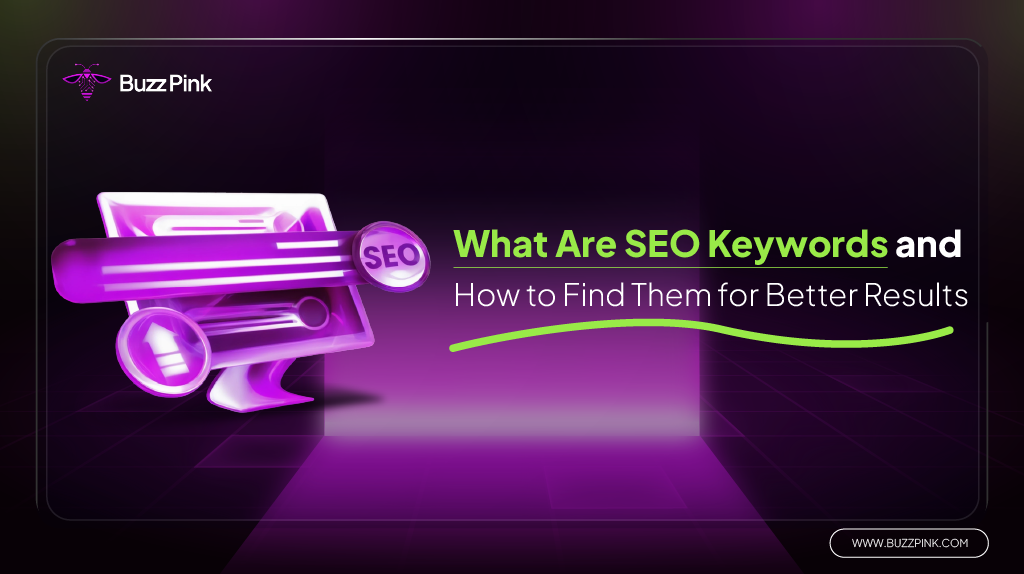If you’ve ever searched for something on Google, such as “how to make a cheesecake,” you’ve used SEO terms. Keywords are the words or phrases that you enter into the search box. In the world of digital marketing, these keywords are critical for directing people to websites or articles that are relevant to their needs.
Understanding and correctly applying SEO keywords is one way for website owners to get their site on Google’s first page. The more people discover your website through searches, the more likely they are to read about it, purchase your products, or learn about your brand. As a result, anyone who wants to succeed online must first understand the various types of SEO keywords and how to find them.
What Are SEO Keywords
 SEO keywords are the words or phrases that people use to search for information on search engines such as Google, Bing, and Yahoo. These keywords serve as a link between what users search for and the content on your website. So, if you have a pet-related blog, you might want to use keywords like “how to care for cats” or “best dog food” to ensure that people searching for those topics find your posts.
SEO keywords are the words or phrases that people use to search for information on search engines such as Google, Bing, and Yahoo. These keywords serve as a link between what users search for and the content on your website. So, if you have a pet-related blog, you might want to use keywords like “how to care for cats” or “best dog food” to ensure that people searching for those topics find your posts.
In other words, SEO keywords allow search engines to understand your content. Google uses keywords to determine the topic of a page and then shows that page to users who are looking for similar topics. So, if you know what words people search for, you can write articles that are easier to find.
Correctly used keywords will help websites rank higher in search results. For example, a health website like Healthline can rank high because it writes articles with keywords that match search intent, such as “fever symptoms” or “how to maintain immunity.”
The first step in developing an SEO strategy is to create a list of relevant keywords. It’s similar to devising a strategy for getting your content in front of the right people. As a result, understanding SEO keywords is essential before beginning to write or optimize your website.
Why Understanding Keywords Is Critical in SEO
Keywords are the foundation of search engine optimization. Google cannot understand your website’s content unless you include keywords. So, by using the right keywords, you can assist search engines in understanding your content and displaying your site to the appropriate audience.
Understanding keywords allows you to attract visitors who are genuinely interested in your topic. For example, an online shoe store could target the phrase “light running shoes” to ensure that visitors are looking to buy running shoes rather than simply reading sports articles.
Keywords also help you understand user trends and needs. You can identify trending topics by looking at what words people frequently search for. This is essential for keeping your content relevant and engaging to a large audience.
Furthermore, using the right keywords not only drives traffic but also boosts conversion rates, but also the number of visitors who eventually buy, register, or take the desired action. Understanding keywords is about attracting truly valuable visitors, not just ranking high on Google.
Search Intentions of SEO Keywords
Every keyword possesses a “search intent.” This means that when someone types something into Google, they have a specific goal in mind, whether it’s to find information, compare products, or simply make a purchase.
Understanding the search intent is critical for determining the type of content to create. For example, someone looking for “what is a dalgona” requires a basic explanation, but someone typing “cafe with dalgona in Singapore” clearly intends to buy. There are four major types of search intent: informational, navigational, commercial, and transactional.
-
Informational
People use this type of keyword to learn something. They don’t want to buy anything right now; instead, they want to learn about or understand a topic. For example, “What is SEO?” or “How do I start a personal blog?”
Explanatory articles, guides, or tutorials can be written for this keyword. For example, an article titled “How to Create a Personal Blog for Beginners” is appropriate for those who are learning how to blog. The goal is not to sell products but to provide information.
Informational keywords are excellent for attracting new readers to your website, particularly those who are unfamiliar with your topic. This is where you can begin to develop trust and relationships with your readers.
-
Navigational
When someone wants to visit a particular website or brand, they use navigational keywords. People type things like “Reddit login”; they already know where they want to go and only need to get to the right page.
This type of keyword is commonly used by users who are already acquainted with a brand. So, if you own an online business, make sure your brand name is easily searchable on Google so that customers can find it right away.
For example, someone typing “Toyota Singapore” clearly intends to visit Toyota’s official website rather than read a general automotive article. As a result, ensure that your SEO optimizes your brand and product names for ease of access.
-
Commercial
People use commercial keywords to compare products or get recommendations before making a purchase. For instance, they could type “best laptop under 10 million SGD” or “Vivienne Westwood vs. Miu Miu.”
This type indicates that users have already decided to make a purchase but want to compare options. For these keywords, you can write comparison articles, lists of recommendations, or product reviews.
For example, an article titled “10 Best Tablets for Students 2025” may appeal to users who are still considering their options. They may then visit your online store or buy one of the items you recommend.
-
Transactional
People who are ready to buy use these types of keywords. Examples include “buy soccer shoes online” and “discount gaming laptops.” They usually know exactly what they want and are simply looking for a place to buy it.
These keywords can be used on product pages, landing pages, and sales advertisements. To entice users to make a purchase, make sure your pages are user-friendly and contain complete information.
Transactional keywords are important for online businesses because they attract visitors who are truly ready to purchase.
Categories of SEO Keywords
 Keywords are distinguished by their form and function, in addition to their search intent. You should be familiar with several types of keywords, including primary, secondary, short-tail, long-tail, branded, and non-branded.
Keywords are distinguished by their form and function, in addition to their search intent. You should be familiar with several types of keywords, including primary, secondary, short-tail, long-tail, branded, and non-branded.
Understanding these classifications allows you to create a more effective SEO strategy. Because each type serves a unique purpose, you can combine them to reach a larger audience in the most effective way.
-
Primary Keywords
The primary keywords are those that serve as the primary focus of a page. For example, if you’re writing an article about “financial management apps,” your primary keyword should be “financial apps.”
These keywords should appear in important places such as the title, first paragraph, and meta description. However, don’t go overboard, as this can appear unnatural.
For example, the NerdWallet website uses the keyword “budgeting apps” to attract visitors. They incorporate the keyword into the title, meta description, and first paragraph. This indicates to Google that financial apps are their primary topic.
-
Secondary Keywords
Secondary keywords are words that complement the primary keyword. They contribute deeper context and variety to your writing. For example, if your primary keyword is “financial apps,” secondary keywords could include “how to manage money with your partner” or “tracking monthly expenses.”
These extra keywords can be incorporated into subheadings or other paragraphs. This helps your writing stay relevant without becoming repetitive.
Google can better understand your article’s overall content if you include secondary keywords. This also makes your writing appear more natural and helpful to readers.
-
Short-Tail Keywords
Short-tail keywords are typically composed of only one or two words. “Makeup,” “perfume,” or “alt clothes” are some examples. These keywords have a high search volume but are also extremely competitive.
Because so many people look up these common terms, it can be difficult to rank high in search results. Short-tail keywords, on the other hand, remain crucial for increasing brand awareness.
For example, if you run an online computer store, targeting the term “laptop” can help your site gain more recognition, even if ranking high is difficult.
-
Long-Tail Keywords
Long-tail keywords, as opposed to short keywords, are more specific and usually contain three or more words. Examples include “cheap gaming laptops under 10 million SGD.”
These keywords receive fewer searches, but they are easier to rank high in search results and are more likely to convert.
People who type “buy a laptop for graphic design” have a clear intent to buy, making these visitors more valuable to website owners.
-
Branded Keywords
Branded keywords are terms that refer to a specific brand. Examples include “Dolls Kill boots,” “iPhone 15,” and “Samsung Galaxy A55.” People who enter these keywords are already familiar with the brand in question.
Read More: How to Target Branded Keywords: A Comprehensive Explanation
People who are ready to buy or are looking for the official website usually use these keywords. For example, “Buy original Nike shoes” expresses a strong desire to purchase.
If your company is well-known, you can use branded keywords to ensure that customers can easily find your products on Google.
-
Non-Branded Keywords
In contrast, non-branded keywords do not mention the brand name. Examples include “best skincare for dry skin” and “good gaming phone.”
People use these keywords to search for general information. They haven’t decided which brand to purchase, so they’re ideal for blog posts or educational guides.
Using non-branded keywords allows you to reach a larger audience while gradually introducing them to your brand.
How to Find SEO Keywords
Finding the right keywords requires more than guesswork. There is a methodical approach to selecting the most appropriate words for your website.
In general, there are two approaches: manual (doing your own research) and quick (using keyword research tools). Let’s talk about each of them.
-
Determine Your Search Intent
The first step is to decide which search intent you want to target. Consider whether you want to attract people who want to learn, compare products, or make an immediate purchase.
For example, if you own a shoe store, you could use keywords such as “best running shoes” (commercial) or “buy original Nike shoes” (transactional). Understanding this intent allows you to create content that is tailored to the needs of your users.
This is an important step to avoid mistargeting. If you write informative articles but your target audience wants to buy, the results will be less than ideal.
-
Surf Search Engines to Find Ideas
Once you’ve determined your intent, open Google and begin typing in your subject. Look at the auto-suggestions below the search bar; these are the words that other people frequently search for.
For example, if you type “how to save money,” Google recommends “how to save money effectively.” This indicates that it is a popular term and may be a good topic for an article.
Check the “People also asked” or “Related searches” section at the bottom of the search results. There are numerous new keyword ideas available.
-
Compile the Findings and Do a Comparison
Create a spreadsheet with all of the keywords you discovered and compare them. Choose the most relevant and high-potential keywords, which have a high number of searches but are not overly competitive.
If “buy a cheap laptop” is too competitive, consider a variation such as “cheap student laptops 2025.” This type of comparison allows you to select the most effective keywords for your website.
-
Build A Mindmap of Your Findings
Next, create a mind map or concept map. To clearly visualize the topic structure, connect the main keywords to their supporting keywords. For example, the primary keyword “healthy food” can be associated with secondary keywords such as “healthy food for kids,” “healthy fast food,” and “affordable diet menu.” This allows you to organize and connect your blog or webpage content more effectively.
-
Use A Research Tool
If you prefer a faster method, use a research tool such as Google Keyword Planner, Ubersuggest, or Ahrefs. These tools can tell you how many people search for a particular keyword each month and how difficult it is to rank high. Using these tools shortens your research time and allows you to find the right keywords using accurate data.
Benefits of Choosing the Right SEO Keywords
 Finding and utilizing the appropriate keywords can provide numerous benefits to your website. Keywords are more than just the number of visitors; they also represent the quality of those visitors. Here are some of the major advantages of using keywords correctly in SEO.
Finding and utilizing the appropriate keywords can provide numerous benefits to your website. Keywords are more than just the number of visitors; they also represent the quality of those visitors. Here are some of the major advantages of using keywords correctly in SEO.
-
Reach
Keywords are like a secret code that unlocks organic traffic. You can reach more people without paying for advertising if you know what words they use. For example, if you write an article about “how to treat acne,” people searching for that topic will come across your website right away. This broadens your audience. The more relevant keywords you use, the more likely your content will be discovered through various searches.
-
Relevance
Keywords also help Google determine how relevant your content is to the search terms used by users. Google will rank your page higher if you use the right keywords. For example, if someone searches for “how to tie a tie,” sites that include that keyword will appear before those that do not. This allows you to reach the audience that is most in need of the information you are providing.
-
Rankings
The better you optimize your keywords, the more likely your website will appear on Google’s first page. Websites that naturally incorporate keywords into their titles, subheadings, and article content typically perform better.
Read More: What Is Rank Tracking? A Complete Guide to SEO Keyword Rankings
Examples of this can be found on large websites such as Tokopedia and Kompas, which consistently use specific keywords in their articles. This is what allows them to consistently appear at the top of search results.
-
Performance
Keywords not only increase traffic, but they also produce tangible results such as sales or sign-ups. Your chances of acquiring customers will increase if you target keywords that are relevant to buyer intent.
For example, the phrase “buy women’s athletic shoes” is far more likely to generate sales than “light exercise tips,” because those searching have already made a purchase decision. As a result, choosing the right keywords can have a significant impact on your online business’s success.
Conclusion
SEO keywords serve as the foundation for a website’s online visibility. A strong and effective SEO strategy requires an understanding of keyword types, search intent, and how to find them.
Remember that SEO is about understanding what people are really looking for, not guessing which keywords are popular. If you can create effective keywords, your site can reach more people, appear more relevant in search results, and even generate real profits.
Kamila Putri is a content strategist and digital marketing expert who helps brands craft messages that resonate and drive results. With a strong foundation in SEO, brand voice, and data-driven strategy, she has produced content that performs, whether it's optimized web copy, lead-generating campaigns, or conversion-focused messaging. At Buzz Pink, she applies this expertise to help clients grow through smart, search-focused digital strategies that engage, inform, and convert.


